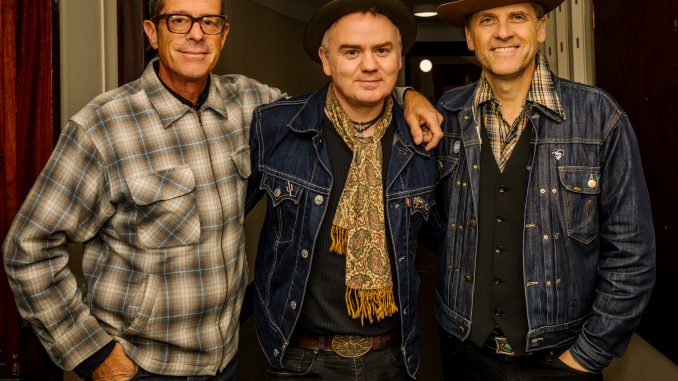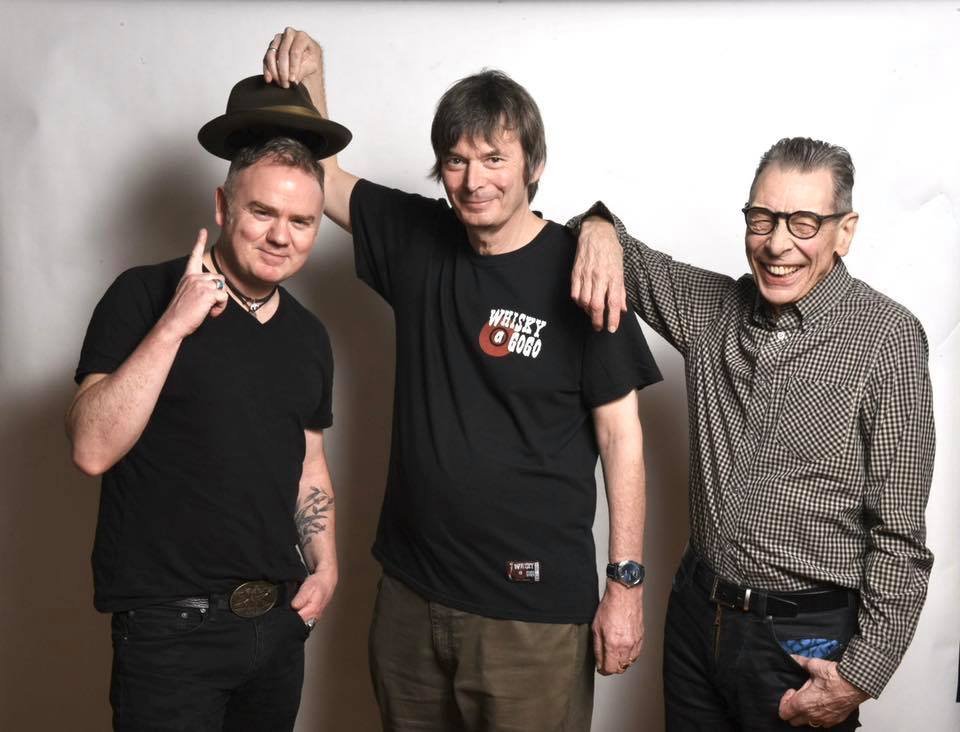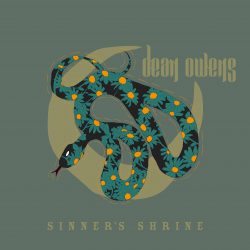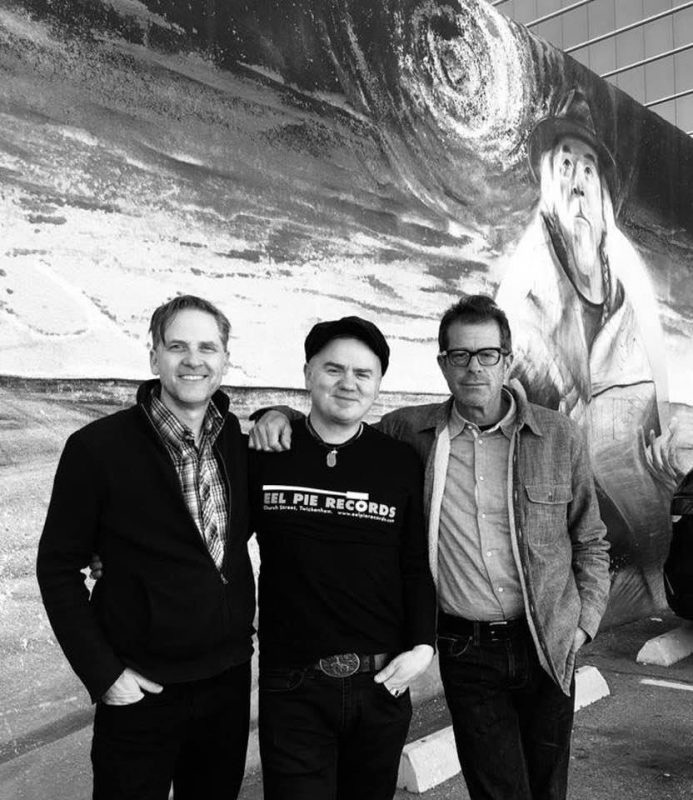
AUK’s 2021 winner of Best UK Act, Scotland’s Dean Owens, and Calexico’s Joey Burns talk of how they bonded in a sun blasted Tucson, cemented their friendship in a wintry Edinburgh, and went on to record together.
To quote Dickens, “It was the best of times, it was the worst of times.” So it must have seemed to Dean Owens, winner of AUK’s UK Act Of The Year in our latest readers’ poll. To say that he has had a topsy turvy Covid lockdown experience is indeed an understatement. Just before the pandemic hit, Owens had opened a new chapter in his career having recorded an album, ‘Sinner’s Shrine’, in Tucson in the company of none other than Calexico. Having returned to the UK, he had a tour planned to promote his then current release, ‘The Man From Leith‘, a career retrospective which was getting some great press. Then, disaster struck. The tour was wiped out after only one show and the music stopped as we all locked down. Owens’s plans for the release of ‘Sinner’s Shrine’ were cast awry and, like most musicians, the only opportunity to engage with an audience was via online shows.
Undaunted, Owens returned to Tucson in a virtual sense and over the past year he released a trio of EPs under the banner of ‘The Desert Trilogy’, each featuring a taster track from ‘Sinner’s Shrine’ along with songs either recorded at the same time or recorded virtually with his new Tucson buddies. Now, two years after it was recorded and as the pandemic seems to be receding, Owens has deemed it time to unveil ‘Sinner’s Shrine’ to the public with the album due to be released in mid February.
Owens is no stranger to recording in the States. Most of his recent albums were recorded in Nashville while he went to New Mexico for his collaboration with members of The Orphan Brigade on ‘Buffalo Blood‘. He’s called his music Celtic Americana, a nod to his love of American music and his home roots in Scotland’s Leith. However, ‘Sinner’s Shrine’ finds him more immersed than ever before in the culture and sound of the American southwest and this is amplified by the contributions from Calexico. Alongside the core duo of Joey Burns and John Convertino, fellow Calexicans Jacob Valenzuela and Sergio Mendoza appear along with a host of other Tucson musicians. The result is an album which will surely appeal to fans of both Owens and Calexico and AUK was grateful to have an opportunity to talk to Dean Owens and Joey Burns about the album via a Zoom chat.
First off, can you tell us how a man from Leith ended up in Tucson recording an album with Calexico?
Dean Owens: It goes back to May 2019, I’d gone to Tucson to take a wee break from my US tour, to chill, soak up the vibe of the city, to get inspired and just maybe write a song or two. Anyhow, long story short, I developed a tooth abscess and I was ill for a few days but I was told of a gig that was happening that might cheer me up, it was in a place called Hotel McCoy and it was a benefit concert for Devotchka band member Tom Hagerman who was having some serious health issues and it so happened that Joey was on the bill, playing with Orkesta Mendoza. Anyhow, it was an extremely hot day and with me being both Scottish and a little bit ginger I was really feeling the heat so in between one of the sets I nipped into the hotel to take advantage of their air conditioning. On my way back out of the hotel, I happened to bump into none other than Joey himself. I said hello and, picking up on my accent, he was quite intrigued. We got talking and he was really interested in what I was doing in Tucson. It was a brief meeting, but we got on well and as we were parting, he said, “Drop me a line sometime.” So a week or two later when I’d restarted my tour in San Jose, California, I did drop him a line. And, much to my surprise he got back to me. We kept in touch and we found that we shared a lot of music that we liked. Joey was really interested in Celtic music and I’ve always been really fond of the Mariachi side of things. So we were keeping in touch and then Joey said something like, “You know you should think about coming back to Tucson someday and record with John and me.” I mean, how do you answer that? Anyway, I was really keen to do that and we were able to talk about it when Calexico were playing in Edinburgh around Christmas time and we went for a wander around the city. We took in some vintage clothes shops, went to the Christmas market and then I met John and the guys at The Usher Hall and we got on great.
Joey, what was it about Dean that led you to offer to record with him?
Joey Burns: Well, he’s got good songs and a great voice, plain and simple! And, I try not to hold it against him that he’s not from Tucson. Seriously, though, I could tell from first glance that he looked like he was from down the street, he was wearing a great western shirt and he had that, you know, “musician” look about him when we met. I was intrigued so that’s why we kept in touch and as I say, Dean’s got great songs. He sent me some songs and I really liked After The Rain and thought we could work together but it was when we actually got together in the studio and I was harmonising to some of his vocals that I thought well, maybe now, we can start our “Aztec Camera meets The Everly Brothers and hangs out with Lalo Guerrero and Johnny Cash down in Nogales Mexico” album. Actually, that might be the follow up, we’re talking about it. I think that our harmonies work really well together.
Dean: Yeah, I remember there was a moment in the studio when John couldn’t work out who was singing what part because our voices blended so well together. It was a big step for me to be sure, actually making the decision to go out to Tucson and hoping that everything would come together. I was excited but I was also quite nervous, worried if I could pull this off. But, once I was there, it felt right and, to be honest, as soon as we ate some Mexican food together it was all hunky dory.

Nerves aside, the album is quite spectacular, a real collaboration with the songs jumping out to be heard.
Joey: That’s because Dean’s a badass! He was delivering keeper vocals on first or second takes, that was amazing, and that’s the core of the record. If the singer’s got his shit together, we just pick up on that. It’s not rocket science, it’s just feeling out the vibe and seeing where people want to take things.
I was going to ask about that vibe. Dean, you wrote all of the songs but the southwest sound and Calexico style are evident throughout the album. Did you write the songs with that in mind?
Dean: I was trying to write songs which I thought would fit but on a couple of them, I was struggling so I got a little help from some friends. Nels Andrews, who originally comes from New Mexico, happened to be in Edinburgh and he helped me with two of them, ‘Arizona’ and ‘Summer In Your Eyes’. There’s also a song I wrote with Gabriel O’Sullivan who I met that first time I was in Tucson, I was a big fan of his album ‘Jupiter’ and I reached out to him through a friend and we met in his local bar and again, we just kept in touch. I was trying to finish ‘Land Of The Hummingbird’ but thought it needed something else and I asked Gabriel if he could add some “Tucson vibe” to it and he did. As for the arrangements, well, Joey had a massive hand in that. When I was writing the songs I had some ideas, a trumpet part here and there and some guitar parts, things like that, but essentially, I’m a guy who sings and strums. Joey and John took that on board and really brought the songs to life.
Joey: And Sergio (Mendoza) as well. He came up with some great arrangements.
Dean: Sergio was brilliant. Initially I had thought that it would just be the three of us playing but then we spoke to Jacob (Valenzuela) who came in on trumpet and then Joey reached out to Sergio and he was delighted to come along and added so much to the sessions. He was only meant to come by for a couple of hours and I remember him having this box of tricks, almost like a kid bringing out his toy box, and then he just tipped everything onto the floor and it was all his percussion instruments. On one of the songs, ‘La Lomita’, it was really more or less an instrumental with some chants and stuff and Sergio just grabbed about everything he could play and added it on to the song. There was also a really wonderful moment when Joey asked local mariachi musician Antonio Pró to come and play the guitarron on the song ‘Compaňera’. That was really special because it brought in that authentic mariachi side of things that I really love.
Joey: Dean did have some really impressive ideas which gave everyone else that template on which to play and build up the songs. His ideas, his melodies were the real starting point, and when I know that an artist like Dean is open to trying things, I’d ask him what he thought about bringing in another instrument or asking someone like Gaby Moreno to sing on a song and I got lots of thumbs up from Dean, so that gave us the opportunity to make a couple of quick calls. So that way we got several folk involved, Sergio, Gaby and also Naim Amor, a local guitarist by way of Paris who has been living in Tucson for the past 20 years. Just different friends who were available and interested and it all happened pretty organically. Tucson’s not like Los Angeles, OK, there may be certain musicians in LA who float around certain studios but Tucson’s much smaller and the musicians are less “professional,” at least in the financial aspect, they’re not session musicians as such. There’s a local vibe, an aesthetic if you want, in this certain circle which we share stylistically in the music we do, it all complements one another.
Dean: That was one of the best things about recording in Tucson. The pool of musicians is brilliant and as Joey says, he could just phone someone and say, “This guy from Scotland is here, would you be able to come in and do this or that?” It was amazing just how he could round up the troops. The only time I had to call on someone was when we had finished the song, ‘The Hopeless Ghosts’, and I felt that I wanted another male voice on it to do harmonies so I messaged my friend Grant-Lee Phillips and he was happy to oblige.
Joey: It was a really great session, we all enjoyed hanging out. Dean mentioned some trepidation regarding coming out to record but Tucson is very laid back, the people, the blue sky, it has an air of optimism about it, there’s hope. It’s a daily reminder, you wake up and the sun is blaring down and it feels good. And it feels even better to duck into a studio and hang out with your friends and play music and express this natural joy. In doing that you’re forgetting the world outside and focussing on this world inside and I just really felt in line and in sync with Dean and I still feel that. It’s a real gift and it’s something that doesn’t happen each time you do a session. But on this record it happened and it felt really effortless and fun and I love the way the songs flow and I think the record will stand the test of time.
Dean: I’d like to add that the trepidation was quickly wiped out. As soon as I heard John on the drum kit and Joey behind the double bass, right from the first song my anxieties were eased by these guys and the friendship that was offered to me and my wife while we were there was really amazing.

In the song notes Dean, you mention the Sinner’s shrine in Tucson a couple of times. Were you aware of the place beforehand or was it something you or was that something you gleaned from Joey‘s local knowledge?
Dean: I stumbled upon that place when I was first in Tucson and met Joey, I was living just down the road from it in an area called Barrio Viejo, and it just captured my imagination. I didn’t really know much about it until I started writing the songs for the album and I looked into its history and the folklore around it. The story is that a ranch hand had an affair with his boss’s wife and the boss found out and killed him with an axe, leaving his body in the street. The ranch hand was buried where he died and this shrine eventually grew around it. People can leave messages in the shrine and it tends to be the throwaways and castaways of love and life and lust. It really captured my imagination. Joey probably knows a lot more about it.
Joey: Dean’s kind of captured what the shrine is about. It’s called El Tiradito, which means “The Castaway”, and it’s one of the only shrines to a burial in unconsecrated ground in the States so it’s kind of a big deal. The shrine is built out of old mud adobe bricks and at its centre there’s an altar where people leave photos and candles and messages. It’s kind of about the acceptance of those who have gone down the path of challenge and difficulties, they may have been good or bad or misinterpreted and it’s right at the heart of downtown in this old Mexican quarter. This part of the States belonged to Mexico for a time. It’s a beautiful spot.
Dean: The thing is that I’m not just singing about that place. Really, it sparked off images and ideas of saints and sinners, the lost and found, love and lust, religion and passion, ideas that inspired many of the songs on the album. It just felt right and I also thought that it would be a good title for the album.
One thing that struck me Dean was just how well you have captured that mixture of history, romance and danger that one associates with the South West, just as you did on the Buffalo Blood album. Much of that album recalled the tribulations of Native Americans and on ‘The Barbed Wire’s Still Weeping’ on the new album, you sing about the plight of Mexican immigrants stranded on the US border and that’s a subject that Joey has addressed also on the Calexico song, ‘Voices In The Field’.
Joey: I was fascinated to hear Dean’s stories about his family, about how they came over from Italy to Scotland and, if you boil it all down, we’re all immigrants and we’re all related in some sense. As far as being a songwriter and telling stories, I really enjoy thinking about other people’s perspectives and especially, travelling around the world and then coming back to the South West, you see a lot of similarities to what people are going through here, and right now there’s been a lot of focus on immigrants. I never tire of hearing a new rendition or a new perspective on immigration as it affects all of us. We’re all searching for identity, we’re searching for stories where we connect and try to find out where we all want to go or just find a better way. As I said earlier, Dean had some great songs which had a depth to them and that was one of the reasons we decided to do this together. I really appreciated how, on his demo of ‘The Barbed Wire’s Still Weeping’, the song had a darkness to it. That’s an important aspect to the music that I make because contrast is super important. So, you might have a song that seems light hearted or positive or major in tone and key but then to have something that is dark and moving or dissident, that really helps to propel the movement of a session or a group of songs.
Dean: When I wrote ‘The Barbed Wire’s Still Weeping’ I had the notion that it would be a big dramatic, cinematic track, but I wasn’t sure how it was going to turn out in reality. I could sort of hear it in my head, but trying to relay that to the other musicians was difficult. I was relying on trying to describe it in words or maybe whistling little bits and pieces of what I wanted it to sound like but as Joey said, it was always meant to be a really dark song and I think we really managed to capture the drama. The amazing thing about that arrangement is that Tom Hagerman, the guy whose benefit show I was at when I met Joey, well, Tom plays all the strings on it. Looking back, if you had told me on that first day that having toothache in Tucson would result in having an album, ‘Sinner’s Shrine’, with all these guys on it, I wouldn’t have believed it.

Talking of light and shade, there are some lighter moments on the album, I’m thinking of the whistling tune, ‘Here Comes Paul Newman’. Here in the west of Scotland growing up, we loved cowboys, John Wayne and Clint Eastwood, and I guess it was the same in the east so that element of the record is great fun.
Dean: I genuinely love those spaghetti western soundtracks, Morricone and such, and I know that Joey’s also a big fan of them. And for me that sound evokes the south west, just like bagpipes remind folk of Scotland. I heard it so much when I was growing up as my dad was a big western movie fan, as you say, Scottish people seem to really love cowboys. So it feels really natural for me to come up with tunes like this one. Just about every day I come up with one which I’ll whistle and I’ve got stacks and stacks of them on my phone and you never know where they’ll end up.
It’s been a long wait for the album to be released, due of course to COVID. In the meantime, you continued to collaborate and released ‘The Desert Trilogy’ on three EPs.
Dean: It’s been almost exactly two years since we recorded the album but then the pandemic started. Regarding the EPs, I have to give Joey credit for that. When everything was closing down I didn’t know what I was going to do with the album and Joey suggested just trying to keep going remotely and that’s when I had the idea of releasing the EPs with just one song from the album on each, along with songs we had recorded but which didn’t make the album. It was good to find a home for them and that just kept things simmering, kept people’s interest. I felt that each EP was like sending up a flare to say “I’m still here” and to be honest, I wasn’t expecting much interest but they really took off and helped keep me afloat.
Well, some folk must have noticed those flares as you were awarded our UK Act Of The Year in our most recent readers’ poll.
Dean: That was really nice, especially as it came from the readers. In a year when I was struggling, it was a huge boost. The most important thing was trying to stay healthy and that includes your mental health. Everyone was finding it tough and having the opportunity to go out and play, to travel and meet new people and explore new cultures taken away from you was very difficult.
Joey: ‘Sinner’s Shrine’ was the very last session we did before COVID and it’s a beautiful snapshot of life leading up to this moment. And life won’t really be the same again so, Sinner’s Shrine kind of bookends a beautiful period of making music together in a certain space in Tucson, Wavelab Studio, with Craig Schumacher. It was a wonderful way to memorialise that, Dean fitted in and he was like a long lost brother. That Dean was willing to write songs with the sort of arrangements that John and I are known for, I think it was very complimentary. Dean and I, we’ve spoken many times since and we’re like, “Oh my gosh, we did that right before the world shut down.” It’s kind of like the last train ride or the last time you get to ride on the world’s best rollercoaster. I’ll never forget it. We’ve got to keep being creative, Dean, we need to get together again so we can write the soundtrack for that Italian lion tamer spaghetti western and our Everly Brothers record.
‘Sinner’s Shrine’ is a true collaboration, sure to satisfy fans of Owens and Calexico. The official release date is 18th February. Shortly after this interview took place, Calexico released details of their new album, ‘El Mirador’, coming our way in April.


